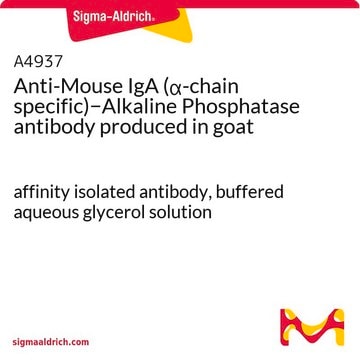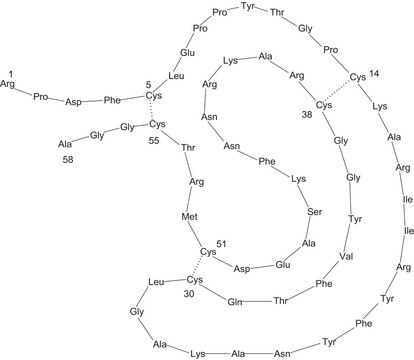A8456
Fluorure de 4-(2-aminoéthyl)-benzènesulfonyle hydrochloride
≥97.0% (HPLC)
Synonyme(s) :
AEBSF
About This Item
Produits recommandés
Source biologique
synthetic (organic)
Niveau de qualité
Pureté
≥97.0% (HPLC)
Forme
powder
Pf
183-191 °C
Solubilité
H2O: 50 mg/mL
Température de stockage
−20°C
Chaîne SMILES
FS(C1=CC=C(CCN)C=C1)(=O)=O.[H]Cl
InChI
1S/C8H10FNO2S.ClH/c9-13(11,12)8-3-1-7(2-4-8)5-6-10;/h1-4H,5-6,10H2;1H
Clé InChI
WRDABNWSWOHGMS-UHFFFAOYSA-N
Vous recherchez des produits similaires ? Visite Guide de comparaison des produits
Description générale
Application
- comme inhibiteur de protéases dans des échantillons de plasma pour éviter la dégradation de la ghréline acylée (AG).
- comme inhibiteur de sérine protéinases de venin de serpent (SVSP) dans un essai d'inhibition de SVSP ou un essai sur l'AEBSF pour tester l'implication des SVSP dans l'activité de la coagulation due au fibrinogène.
- comme constituant d'un tampon de lyse NP-40 pour remettre en suspension des culots cellulaires afin de préparer des lysats cellulaires.
Actions biochimiques/physiologiques
Mention d'avertissement
Danger
Mentions de danger
Classification des risques
Eye Dam. 1 - Skin Corr. 1A
Code de la classe de stockage
8A - Combustible corrosive hazardous materials
Classe de danger pour l'eau (WGK)
WGK 3
Point d'éclair (°F)
Not applicable
Point d'éclair (°C)
Not applicable
Faites votre choix parmi les versions les plus récentes :
Certificats d'analyse (COA)
Vous ne trouvez pas la bonne version ?
Si vous avez besoin d'une version particulière, vous pouvez rechercher un certificat spécifique par le numéro de lot.
Déjà en possession de ce produit ?
Retrouvez la documentation relative aux produits que vous avez récemment achetés dans la Bibliothèque de documents.
Les clients ont également consulté
Articles
ReadyShield® phosphatase and protease inhibitor cocktail FAQ for sample protection in a variety of cell types and tissue extracts, including mammalian, plant, and microbial samples. Our ReadyShield® Protease Inhibitor Cocktail is a non-freezing solution that contains inhibitors with a broad specificity for serine, cysteine, acid proteases and aminopeptidases.
ReadyShield® phosphatase and protease inhibitor cocktail FAQ for sample protection in a variety of cell types and tissue extracts, including mammalian, plant, and microbial samples. Our ReadyShield® Protease Inhibitor Cocktail is a non-freezing solution that contains inhibitors with a broad specificity for serine, cysteine, acid proteases and aminopeptidases.
ReadyShield® phosphatase and protease inhibitor cocktail FAQ for sample protection in a variety of cell types and tissue extracts, including mammalian, plant, and microbial samples. Our ReadyShield® Protease Inhibitor Cocktail is a non-freezing solution that contains inhibitors with a broad specificity for serine, cysteine, acid proteases and aminopeptidases.
ReadyShield® phosphatase and protease inhibitor cocktail FAQ for sample protection in a variety of cell types and tissue extracts, including mammalian, plant, and microbial samples. Our ReadyShield® Protease Inhibitor Cocktail is a non-freezing solution that contains inhibitors with a broad specificity for serine, cysteine, acid proteases and aminopeptidases.
Notre équipe de scientifiques dispose d'une expérience dans tous les secteurs de la recherche, notamment en sciences de la vie, science des matériaux, synthèse chimique, chromatographie, analyse et dans de nombreux autres domaines..
Contacter notre Service technique












